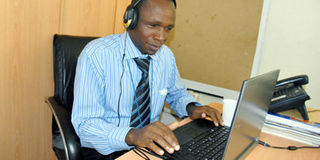The visually impaired banker

Regardless of visual impairment, Deus Turyatemba, a banker at Standered Chartered Bank has risen through the ranks. PHOTOS BY RACHEL AJWANG.
What you need to know:
Beating ODDS. Deus Turyatembe is a banker who lost his sight to measles. He shared his life journey with Rachel Kanyoro.
On meeting Deus Turyatemba, I introduce myself and he smiles. His jolly appeal is infectious. Looking closely at his face, his eyeballs are covered with white. He is visually impaired and has achieved much more than his two-eyed counterparts. An employee at Standard Chartered Bank, Turyatemba works in the Public Relations department and heads the Diversity and Inclusion Programme.
Early life
Born in 1982, in a family of seven children to farmer parents in Kabale District, Turyatemba was a healthy child until he turned eight and suffered from measles. His naive parents, took him to traditional herbalists who did not reverse the situation. The people in his village blamed his parents for failing to appease the ancestors with the first sorghum harvest as was the common practice in the day. Unfortunately, the illness took away his sight.
Education
Turyatemba was in Primary Two and had to leave regular school and he joined Hornby Primary School in Kabale District that had a programme for the visually impaired. Due to his excellent performance in school, he got a scholarship that was funded by the local government. When he joined secondary school for his O-Level at Hornby S.S, he still got a scholarship.
He later joined Iganga Secondary School where he studied history, economics and divinity and scored 16 points which earned him government sponsorship at Makerere University.
During examinations at the university, an examiner had to read the questions for Turyatemba. Then, he graduated with a second class upper degree in Social Sciences in 2004.
Career
After university, Turyatemba joined several other unemployed fresh graduates and started job hunting. Determined to work, he got a job at the Uganda National Association for the Blind where he taught computer skills to the blind. “It was important for me to work as I prepared myself for more challenging roles and improve my CV,” he explains.
Two years later, Turyatemba felt over qualified for the job and set out to seek a job that matched his qualifications. He did not limit himself and applied to numerous organisations including European Union, NGOs and banks.
Going to the bank
One day, Turyatemba had gone to meet Herbert Zake, the head of corporate affairs at Standard Chartered Bank to fund one of his computer projects. Zake was impressed by the young man’s computer skills. He left a mark and when a job opening appeared three months later at the bank, he was asked to present his CV and underwent a series of interviews which he passed highly and was hired at Standard Chartered Bank Speke Road branch.
“I got my job because of the skills I displayed while interacting with Zake, hard work and not because I’m visually impaired,” he says, adding: “I hope to rise in ranks and become the managing director because there is no limit to achievements, if you position yourself for the opportunity that waits.”
Communication skills
Technology is one of his many interests and he is able to connect with people on his phone with the help of an application called screen reader that directs the phone to dial numbers and write messages.
For the computer, he uses an application called Job Access with Speech (JAWS), a computer screen reader programme for Microsoft windows that allows the visually impaired users to read the screen with a text- to-speech output.
Love life
When asked about his love life, Turyatemba’s face lights up immediately.
“Having a wife is such a precious gift,” he says fondly. Married to Harriet Nabakooza, a businesswoman, he tells of how they met after university when he was doing voluntary work for an NGO called Sight Savers.
“I was living in Namugongo where I used to meet Harriet at the taxi stage on my way to work. I picked interest in her and later proposed,” says Turyatemba. The reception at first, he says, was not affirmative




